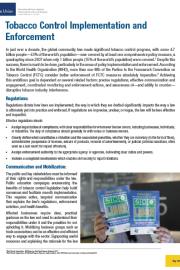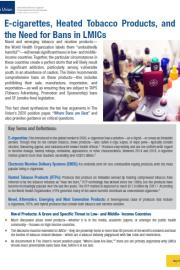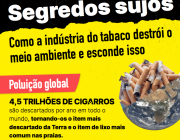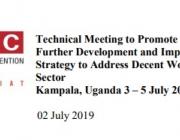
Anualmente, a OMS homenageia indivíduos e organizações de cada uma das seis regiões da OMS por suas contribuições excepcionais ao controle do tabaco. Essas distinções incluem os Prêmios de Reconhecimento Especial do Diretor-Geral da OMS, os Prêmios do Dia Mundial Sem Tabaco e, em 2025, um Certificado de Reconhecimento Especial do Diretor-Geral da OMS.
PRÊMIOS do Dia Mundial Sem Tabaco 2025 – conheça os vencedores. World Health Organization, Genebra, 19 maio 2025. Disponível em: https://www.who.int/news/item/19-05-2025-world-no-tobacco-day-2025-award.... Acesso em: 19 maio 2025.

The Conference of the Parties, at its sixth session, adopted a decision to further promote implementation of Article 5.3 and its Guidelines among the Parties, especially in relation to the industry efforts to undermine tobacco control efforts internationally. The decision also notes with concern that recent experience indicates that tobacco industry strategies and tactics go beyond national borders, and recognizes the role of international cooperation in preventing interference by the tobacco industry. With its operative paragraphs, decision FCTC/COP6(14) complements recommendations of Article 5.3 Guidelines, adopted at COP3 in 2008, that call upon Parties to apply a series of measures in their national settings. Both Article 5.3 Guidelines and the Decision FCTC/COP6(14) recognize the need to monitor implementation of Article 5.3, including the monitoring of the tobacco industry interference and the measures to counteract them.
FRAMEWORK CONVENTION ON TOBACCO CONTROL. Terms of reference for tobacco industry observatories. World Health Organization, [s.l.], 2008. 6p.

In just over a decade, the global community has made significant tobacco control progress, with some 4.7 billion people—63% of the world’s population—now covered by at least one comprehensive policy measure, a quadrupling since 2007 when only 1 billion people (15% of the world’s population) were covered.1 Despite this success, there is much to be done, particularly in the areas of policy implementation and enforcement. According to the World Health Organization (WHO), more than one-fifth of the Parties to the Framework Convention on Tobacco Control (FCTC) consider better enforcement of FCTC measures absolutely imperative.2 Achieving this ambitious goal is dependent on several related factors: precise regulations, effective communication and engagement, coordinated monitoring and enforcement actions, and awareness of—and ability to counter— disruptive tobacco industry interference.
TOBACCO Control Implementation and Enforcement. The Union, [s.l.], May, 2022. 4p.

Novel and emerging tobacco and nicotine products—the World Health Organization labels them “undoubtedly harmful”1—will wreak significant havoc in low- and middle- income countries. Together, the particular circumstances in these countries create a perfect storm that will likely result in significant addiction, particularly among vulnerable youth. In an abundance of caution, The Union recommends comprehensive bans on these products—this includes prohibiting their sale, manufacture, importation, and exportation—as well as ensuring they are subject to TAPS (Tobacco Advertising, Promotion and Sponsorship) bans and SF (smoke-free) legislation.
E-CIGARETTES, Heated Tobacco Products, and the Need for Bans in LMICs. The Union, [s.l.], May, 2022. 4p.
In celebration of the World no Tobacco Day, the WHO FCTC Knowledge hub for Articles 17 and 18 has launched a campaign on the impacts of the tobacco production chain on the environment and workers' health.

Greenwashing é uma tática usada por indústrias nocivas para parecerem socialmente responsáveis, enquanto, na realidade, seus produtos e práticas de negócios estão destruindo o meio ambiente. A indústria do tabaco despeja resíduos tóxicos nas comunidades e esgota os recursos naturais. Não há nada de “verde” nisso. Mas a indústria finge que está se transformando ao fazer uma lavagem verde de sua imagem para construir influência junto aos formuladores de políticas, especialmente em países de baixa e média renda, e influenciar as políticas para ajudar os lucros das empresas de tabaco. o planeta, mas quando a indústria do tabaco o faz, também viola um tratado global de saúde pública.
SECREDOS sujos: Como a indústria do tabaco destrói o meio ambiente e esconde isso. A Global Tobacco Industry Watchdog (STOP), [s.l.], 25 mai. 2022.
Responsible for the development of the National Health Policy in his native Pakistan, Dr. Ehsan Latif, now based in Scotland, has a long career on the boards of various public health entities and international groups in the field of lung health and tobacco control established under the Framework Convention for Tobacco Control and the World Health Organization including The Framework Convention Alliance, the Non-Communicable Disease Alliance, and most recently (2009-2017) he was senior advisor for noncommunicable diseases and director of tobacco control at the International Union Against Tuberculosis and Lung Diseases.
DR. Ehsan Latif: “WHO and FCTC Secretariat cannot sustain their current position”. The Vaping Today, Peru, 8 nov 2021. Disponível em: https://www.thevapingtoday.com/dr-ehsan-latif-who-and-fctc-secretariat-c.... Acesso em: 1 jul 2024.
In September 2015, representatives of the 193 UN member states acknowledged that eradicating poverty in all off its forms and dimensions, especially extreme poverty, is the greatest global challenge and an indispensable requirement for sustainable development. By adopting the document “Transforming our World: The 2030 Agenda for Sustainable Development” (A/70/L.1)1 , the countries resolved to take action to promote sustainable development in the next 15 years pledging “that no one will be left behind ». The 2030 Agenda is a plan of action designed to deal with areas that are critical to both humanity and the planet. It includes actions aimed to the wellbeing of people, the environment, bringing about peace and prosperity.
TURCI, Silvana Rubano Barretto. SILVA, Vera Luiza da Costa e. Interference of the tobacco industry in the 2030 Agenda. CETAB, Rio de Janeiro, 26 out 2021. Acesso em: 10 jul 2024.

"The WHO Framework Convention on Tobacco Control (FCTC) was: 1 negotiated under the WHO Constitutional Mandate; 2 becoming the first convention with a modern structure with objectives in the field of Public Health, but also addressing the social, economic and environmental impact of tobacco. It currently covers more than 90 percent of the global population. It is an evidence-based treaty addressing both the supply and demand of tobacco products and reaffirms the right of all people to the highest standard of health. It guides and informs the global tobacco control agenda and is a legally binding instrument."
DECLARAÇÃO da Secretaria da Convenção-Quadro da OMS para o Controle do Tabaco e o Protocolo para Eliminar o Comércio Ilícito de Produtos de Tabaco. Secretariado da Convenção-Quadro para o Controle do Tabaco, Uganda, 2 jul. 2019.